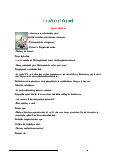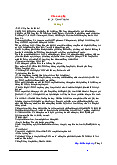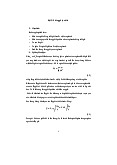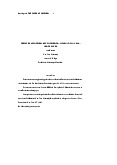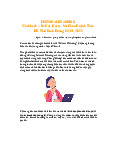








Preview text:
IELTS Cambridge 18: University Students and Main Subjects
Many university students want to learn about different subjects in addition to their main
subjects. Others feel it is more important to give all their time and attention to studying for their qualification.
Discuss both views and give your opinion.
Many university students are now inclined to divide their time between studying for their major
and pursuing interests in unrelated subjects. In my opinion, it is crucial for undergraduates to
learn about a wide range of disciplines in order to best prepare themselves for the future.
Those who support prioritizing one's major argue the importance of specialization. At university,
there are a range of potential distractions related to social life and living on one's own. If a
graduate wants to be successful in a future career, the most logical pathway is to prepare
diligently in a one specialization. For instance, an undergraduate learning about chemical
engineering will be a better potential candidate for well-paid positions if they have acquired a
solid theoretical foundation and accumulated whatever practical experience is available in their
courses. Any diversions that detract from this focus could hinder their early career progression.
However, it is in fact more valuable long-term to view learning as an interdisciplinary
experience. Many graduates will change or at least alter their professions as they begin working.
Even those who remain in the same industry will benefit greatly from studying a variety of
subjects. The above-mentioned engineer might be able to study about figure drawing outside
their main courses and come up with more creative ideas that combine multiple subjects in their
main work. Even if the other subjects are not directly applicable to work, at the minimum they
are likely to feel they have become a more diverse and well-rounded individual on a personal level.
In conclusion, though time spent on one's university major can lead to an improved discrete
skillset, there is far greater value in possessing a breadth of knowledge. This range of
information will serve as the foundation for a potentially more creative and fulfilling career and personal life. Analysis
1. Many university students are now inclined to divide their time between studying for their
major and pursuing interests in unrelated subjects. 2. In my opinion, it is crucial for
undergraduates to learn about a wide range of disciplines in order to best prepare themselves for the future.
1. Paraphrase the overall essay topic.
2. Write a clear opinion. Read more about introductions here.
1. Those who support prioritizing one's major argue the importance of specialization. 2. At
university, there are a range of potential distractions related to social life and living on one's
own. 3. If a graduate wants to be successful in a future career, the most logical pathway is to
prepare diligently in a one specialization. 4. For instance, an undergraduate learning about
chemical engineering will be a better potential candidate for well-paid positions if they have
acquired a solid theoretical foundation and accumulated whatever practical experience is
available in their courses. 5. Any diversions that detract from this focus could hinder their early career progression.
1. Write a topic sentence with a clear main idea at the end. 2. Explain your main idea.
3. Develop it with specific or hypothetical examples. 4. Keep developing it fully.
5. Vary long and short sentences.
1. However, it is in fact more valuable long-term to view learning as an interdisciplinary
experience. 2. Many graduates will change or at least alter their professions as they begin
working. 3. Even those who remain in the same industry will benefit greatly from studying a
variety of subjects. 4. The above-mentioned engineer might be able to study about figure
drawing outside their main courses and come up with more creative ideas that combine multiple
subjects in their main work. 5. Even if the other subjects are not directly applicable to work, at
the minimum they are likely to feel they have become a more diverse and well-rounded
individual on a personal level.
1. Write a new topic sentence with a new main idea at the end.
2. Explain your new main idea.
3. Include specific details and examples.
4. Add as much information as you can and make sure it links logically.
5. Finish the paragraph strong.
1. In conclusion, though time spent on one's university major can lead to an improved discrete
skillset, there is far greater value in possessing a breadth of knowledge. 2. This range of
information will serve as the foundation for a potentially more creative and fulfilling career and personal life. 1. Summarise your main ideas.
2. Include a final thought. Read more about conclusions here. Vocabulary
What do the words in bold below mean? Make some notes on paper to aid memory and then check below.
Many university students are now inclined to divide their time between studying for their
major and pursuing interests in unrelated subjects. In my opinion, it is crucial for
undergraduates to learn about a wide range of disciplines in order to best prepare themselves for the future.
Those who support prioritizing one's major argue the importance of specialization. At university, there are a
range of potential distractions related to social life and living on one's
own. If a graduate wants to be successful in a future career, the most logical pathway is to
prepare diligently in a one specialization. For instance, an undergraduate learning about
chemical engineering will be a better potential candidate for well-paid positions if they have
acquired a solid theoretical foundation
and accumulated whatever practical experience is
available in their courses. Any diversions that detract from this focus could hinder their early career progression.
However, it is in fact more valuable long-term to view learning as an interdisciplinary
experience. Many graduates will change or at least alter their professions as they begin
working. Even those who remain in the same industry will benefit greatly from studying a
variety of subjects. The above-mentioned engineer might be able to study about figure
drawing outside their main courses and come up with more creative ideas that combine
multiple subjects in their main work. Even if the other subjects are not directly applicable to
work, at the minimum they are likely to feel they have become a more diverse and well-
rounded individual on a personal level.
In conclusion, though time spent on one's university major can lead to an improved discrete
skillset, there is far greater value in possessing a breadth of knowledge. This range of
information will serve as the foundation for a potentially more creative and fulfilling career and personal life. Answers
For extra practice, write an antonym (opposite word) on a piece of paper to help you remember the new vocabulary:
now inclined to divide their time between studying for their major and these days like to
split time on their main subject and other subjects
pursuing interests in unrelated subjects looking into different subject areas
it is crucial for undergraduates important for students at university
wide range of disciplines lots of different subjects in order to so that
best prepare better get ready for
Those who support prioritizing one's major argue the people in favor of focusing on just their main subject importance value
specialization focusing on one area
range of potential distractions related to social life lots of possible ways to not focus concerning personal life
living on one's own not living with parents successful doing well
most logical pathway clearest way
prepare diligently get ready carefully
chemical engineering working with chemicals to make things
better potential candidate good applicants well-paid positions good jobs acquired get
solid theoretical foundation good understanding of the basics of a subject
accumulated whatever practical experience is available in their courses get real-life experience from their classes diversions distractions detract distract focus concentration
hinder their early career progression hurt how well they do in their first job long-term in the future view learning see studying
interdisciplinary experience studying lots of different subjects
graduates people who finish school
at least alter at minimum change a it professions jobs
remain in the same industry stay in the same area
benefit greatly get a lot from
studying a variety of subjects learning lots of areas
above-mentioned engineer worker I talked about before
figure drawing learning to draw people come up with think of
creative ideas imaginative concepts multiple many
directly applicable to work can be use at work at the minimum at least diverse different
well-rounded overall strong, balanced
on a personal level personally, related to private life
improved discrete skillset better at certain skills
far greater value in more importance from
breadth of knowledge lots of information, knowing about many different subjects
serve as the foundation as the basis for
potentially more creative and fulfilling career and personal life possible a better job and private life Pronunciation
Practice saying the vocabulary below and use this tip about Google voice search: ænd s - æt æt - æz ænd ænd Vocabulary Practice
I recommend getting a pencil and piece of paper because that aids memory. Then write down
the missing vocabulary from my sample answer in your notebook: Many university students are
n____________________________________________________________d
p_____________________n u________________s. In my opinion,
i____________________________s to learn about a w____________________s
i____________o b_____________e themselves for the future.
T_________________________________________________e the i____________e of
s_____________n. At university, there are a ________________________________ r s
r____________o s____________e and l___________________n. If a graduate wants to be
s___________l in a future career, the m____________________y is to p________________y in
a one s______________n. For instance, an undergraduate learning about
c_________________________g will be a b_________________________e for
w_________________s if they have a___________d a s___________________________n and
a_____________________________________________________________s. Any
d____________s that d_______t from this f______s could
h_______________________________________n.
However, it is in fact more valuable l__________m to v____________g as an
i____________________________e. Many g____________s will change or a____________r
their p___________s as they begin working. Even those who
r________________________________y b_____________y will from
s_______________________________s. The a________________________________r might
be able to study about f__________________g outside their main courses and
c________________h more c___________________s that combine m_________e subjects in
their main work. Even if the other subjects are not d________________________k,
a________________m they are likely to feel they have become a more d________e and
w______________d individual o____________________l.
In conclusion, though time spent on one's university major can lead to an i__________________________t f
, there is ________________n possessing a
b__________________e. This range of information will s________________________n for a
p_____________________________________________________________________e. Listening Practice
Learn more about this topic by watching from YouTube below and practice with these activities:
https://www.youtube.com/watch?v=B6lBtiQZSho&pp=ygUTcmFuZ2UgZGF2aWQgZXBzdGV pbg%3D%3D Reading Practice
Read more about this topic and use these ideas to practice:
https://www.timeshighereducation.com/student/blogs/scariest-courses-you-ca -stud n y-university Speaking Practice
Practice with the following speaking questions from the real IELTS speaking exam: School
1. Did you like your school when you were a child? 2. What did you learn about?
3. Did you have a favorite teacher?
4. Are there many rules in schools in your country? Writing Practice
Practice with the related IELTS essay topics below:
Some educational systems make students study specialised subjects from the age of fifteen while
others require students to study a wide range.
Discuss both sides and give your own opinion.
